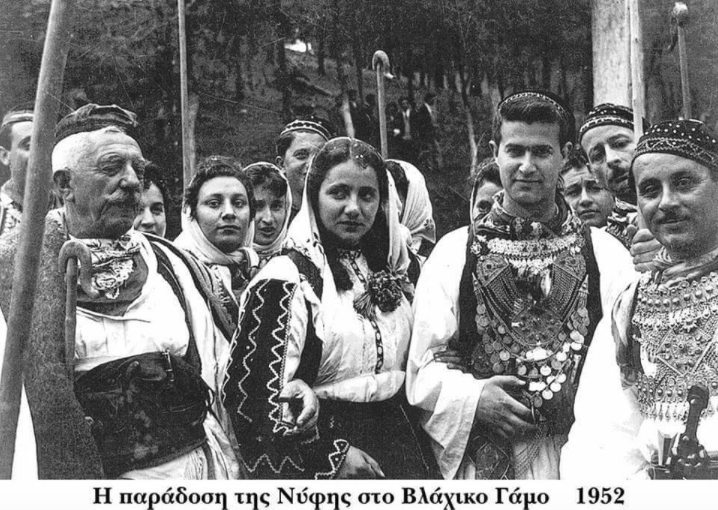Dec 29
S. Bletsas : Why Armans need to survive in Europe

« De ce au nevoie armânii pentru a supraviețui în Europa » : acesta este titlul intervenției în engleză a lui S. Bletsas la seminarul organizat anul trecut de Centrul internațional pentru minorități Convivenza la Müstair, în Elveția, pe tema îmbunătățirii vieții și instituțiilor popoarelor autohtone fără stat propriu în Europa. 35 de experți din 15 țări europene, reprezentând o duzină de comunități culturale și lingvistice fără stat propriu au participat la seminar. Prinre aceste popoare autohtone/comunități culturale și lingvistice se numără și aromânii. Despre ei au intervenit, în afară de S. Bletsas, Nicolas Caracota, Kristo Goci, Florentina Costea și S. Bletsas. Actele seminarului au fost publicate în cartea apărută anul acesta cu titlul Innovation and Learning to Manage Diversity in Governance, Raoul Blindenbacher (ed.).
Since the Armans have no representation in European organizations and suffer from total obscurity regarding their situation, we need to emphasize the importance of the CONVIVENZA Foundation, International Center for Minorities, in our efforts to achieve a resolution of the European Parliament and adopt a program of projects specific to minorities such as the Armans.
Implementation plan
Publication of Armanian language textbooks for primary schools, grammar for elementary schools and gymnasia and a Greek-Armanian dictionary.
Starting the Armanian language teachers’ course as well as teaching in public schools.
Right to self-identification and the right to be counted separately during the next census.
Qualified teachers and educational materials.
Kindergarten and schools that will provide education in our language too.
Effective participation in decision-making in matters affecting our rights.
Protection of our language and culture within a clear and firm legal framework.
A new European awareness of the question of minorities in general and regional languages in particular, which unfortunately have not to date benefited the Armans.
Better knowledge of the issues facing minorities in Europe and better contact and solidarity between them.
Contribution to the improvement of our people’s lives
Whereas there were over 500,000 Aromanian speakers at the beginning of the twentieth century, there are now only about half that number, dispersed through Albania, Bulgaria, Greece, North Macedonia and Serbia, which are their home countries, as well as Romania, Germany, the United States of America and Australia. Most of them are elderly. Armanian, as a minority language is under threat.
The scale of the problem has become evident since the extension of cultural cooperation towards the Balkans, the home of the Armanians.
3. The Armanian language and culture are facing a similar fate to that of many European cultures which are becoming or have become extinct. However, the acceptance of a pluralist system of cultural values is a pre-requisite for stability in Europe, and particularly in the Balkans.
4. The Armanians make no political demands, but merely want assistance in safeguarding their language and culture, which seem doomed to extinction unless the European institutions, and the Council of Europe in particular, come to their aid.
The Assembly recommended that the Committee of Ministers:
– encourage Balkan states which comprise Armanian communities to sign, ratify and implement the European Charter of Regional or Minority Languages and invite them to support the Armanians, particularly in the fol- lowing fields:
education in their mother tongue,
religious services in Aromanian in their churches,
newspapers, magazines and radio and television programs in Armanian, and
support for their cultural associations;
– invite the other member states to support the Armanian language, for instance by creating university professorships in the subject and disseminating the most interesting products of Armanian culture throughout
Europe by means of translations, anthologies, courses, exhibitions and the- atrical productions;
– introduce fellowships for artists and writers from Armanian minority groups throughout the Balkans, so that they can engage in appropriate creative work in the fields of Armanian language and culture;
– request the Council for Cultural Cooperation to ensure co-ordination of the activities of Armanian academic centers throughout Europe;
– invite the education ministers of member states to include Armanian history in European history books;
– seek to establish co-operation and partnership with organizations, foundations and other interested bodies in the private sector with a view to implementing these recommendations; and
– take account of Armanian culture in its follow-up to Recommendation 1291 from 1996, particularly where the «laboratory for dispersed ethnic minorities» is concerned.
The Armanians only want official recognition as a national minority and support from the authorities of the states in which they live, particularly in the following fields:
mother tongue teaching,
services in Armanian in their churches,
newspapers, magazines and radio and television programs in Armanian, and
support for their cultural associations.
Steps already taken and conclusion
We have been able to develop our two new online courses for the learning of our language, and we have actually sold over 3.000 Armanian learning method books for non Armanian speakers. The future of a minority language depends on its use in online portals and smartphones and social media.
See: https://mathainoumevlaxika.oivlaxoi.gr/(Retrieved: July 18 2022). See: https://www.vlahika.gr/(Retrieved: July 18 2022).
Conclusion: Minority languages like Armanian will only survive with economic value and visibility in daily life. Education is important, but not sufficient.
